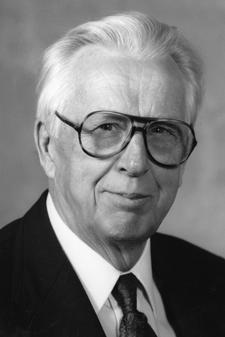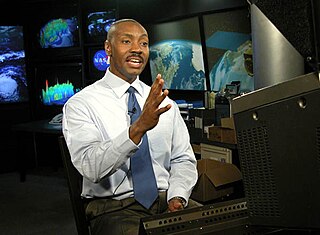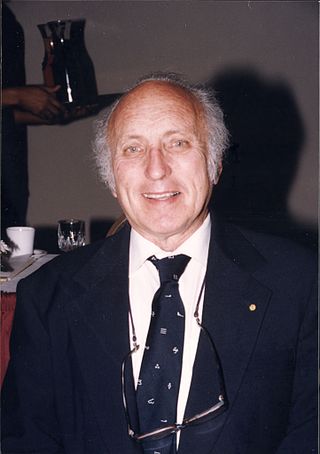
A meteorologist is a scientist who studies and works in the field of meteorology aiming to understand or predict Earth's atmospheric phenomena including the weather. Those who study meteorological phenomena are meteorologists in research, while those using mathematical models and knowledge to prepare daily weather forecasts are called weather forecasters or operational meteorologists.

The American Meteorological Society (AMS) is a scientific and professional organization in the United States promoting and disseminating information about the atmospheric, oceanic, and hydrologic sciences. Its mission is to advance the atmospheric and related sciences, technologies, applications, and services for the benefit of society.
This is a list of meteorology topics. The terms relate to meteorology, the interdisciplinary scientific study of the atmosphere that focuses on weather processes and forecasting.

Verner Edward Suomi was a Finnish-American educator, inventor, and scientist. He is considered the father of satellite meteorology. He invented the Spin Scan Radiometer, which for many years was the instrument on the GOES weather satellites that generated the time sequences of cloud images seen on television weather shows. The Suomi NPP polar orbiting satellite, launched in 2011, was named in his honor.

Harry Wexler was an American meteorologist, born in Fall River, Massachusetts.

Guy Stewart Callendar was an English steam engineer and inventor. His main contribution to human knowledge was developing the theory that linked rising carbon dioxide concentrations in the atmosphere to global temperature. In 1938, he was the first to show that the land temperature of Earth had risen over the previous 50 years. This theory, earlier proposed by Svante Arrhenius, has been called the Callendar effect. Callendar thought this warming would be beneficial, delaying a "return of the deadly glaciers."
John William Servos is an American professor and historian of science. His research centers on the historical development of science as a discourse and in the form of institutions and on how science has situated itself historically in the culture at large.

Joanne Simpson was the first woman in the United States to receive a Ph.D. in meteorology, which she received in 1949 from the University of Chicago. Simpson received both her undergraduate and graduate degrees from the University of Chicago, and did post-doctoral work at Dartmouth College. Simpson was a member of the National Academy of Engineering, and taught and researched meteorology at numerous universities as well as the federal government. Simpson contributed to many areas of the atmospheric sciences, particularly in the field of tropical meteorology. She has researched hot towers, hurricanes, the trade winds, air-sea interactions, and helped develop the Tropical Rainfall Measuring Mission (TRMM).

Warren Morton Washington is an American atmospheric scientist, a former chair of the National Science Board, and currently a Distinguished Scholar at the National Center for Atmospheric Research (NCAR) in Boulder, Colorado.
Edward Epstein was an American meteorologist who pioneered the use of statistical methods in weather forecasting and the development of ensemble forecasting techniques.
Louis Joseph Battan was an American atmospheric scientist who received his doctorate from the University of Chicago in 1953, where he was hired to work in the field of the physics of clouds and precipitation. In 1958 he was appointed professor of meteorology and associate director of the Institute of Atmospheric Physics at the University of Arizona in Tucson. He was a pioneer in cloud physics and radar meteorology.

David Atlas was an American meteorologist and one of the pioneers of radar meteorology. His career extended from World War II to his death: he worked for the US Air Force, then was professor at the University of Chicago and National Center for Atmospheric Research (NCAR), researcher at NASA and private consultant. Atlas owned 22 patents, published more than 260 papers, was a member of many associations, and received numerous honors in his field.

James Henry Coffin was an American mathematician and meteorologist.
Robert Earl Dickinson is an American meteorologist and geoscientist.

Maria Janeth Molina is an American meteorologist. She was the on-air meteorologist for the Fox News Channel, a U.S. television network, from 2010 to 2016. As of 2022 she is an Assistant Professor in the Department of Atmospheric and Oceanic Science at the University of Maryland, College Park.

James Marshall Shepherd is an American meteorologist, professor at the University of Georgia's Department of Geography, director of the university's atmospheric sciences program, and 2013 president of the American Meteorological Society (AMS). In 2020 he was awarded the AAAS Award for Public Engagement with Science. In 2021, he was elected to the U. S. National Academy of Engineering.

Edwin Kessler III was an American atmospheric scientist who oversaw the development of Doppler weather radar and was the first director of the National Severe Storms Laboratory (NSSL).

Claire Lucille Parkinson is an American Earth scientist and climatologist at NASA's Goddard Space Flight Center.

Anne Mee Thompson is an American scientist, who specializes in atmospheric chemistry and climate change. Her work focuses on how human activities have changed the chemistry of the atmosphere, climate forcing, and the Earth's oxidizing capacity. Thompson is an elected fellow of the American Meteorological Society, American Geophysical Union, and AAAS.

William Ka Ming Lau is a senior scientist at the Earth System Science Interdisciplinary Center, a research center at the University of Maryland and an adjunct professor of the Department of Atmospheric and Oceanic Sciences at the University of Maryland. A physicist by training, his research spans over 4 decades covering a wide range of topics in climate dynamics, tropical meteorology, ocean-atmosphere coupling, aerosol-water cycle interactions, and climate variability and change. Lau conducted pioneering research on atmospheric teleconnection, and the global monsoon climate system. He discovered the aerosol-monsoon regional feedback mechanism, i.e., the Elevated Heat Pump (EHP) effect that strongly modulate climate change in Asian monsoon regions. He was the senior author of a popular research reference book, “Intraseasonal Variability in the Atmosphere-Ocean Climate System”. As of November 2020, he has coauthored 297 refereed papers, with total citation = 33,932, h-index=101.















